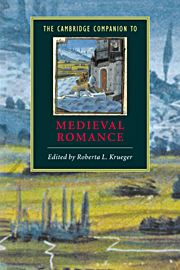Book contents
- Frontmatter
- Introduction
- Part 1 The origins, forms, and contexts of medieval romance
- Part 2 European romance and medieval society
- Part 3 European transformations
- 10 The evolution and legacy of French prose romance
- 11 Medieval German romance
- 12 Chivalry and medieval Italian romance
- 13 Gawain and popular chivalric romance in Britain
- 14 Middle English romance
- 15 Romance at the crossroads
- Editions and translations
- Index
- Series list
15 - Romance at the crossroads
medieval Spanish paradigms and Cervantine revisions
from Part 3 - European transformations
Published online by Cambridge University Press: 28 May 2006
- Frontmatter
- Introduction
- Part 1 The origins, forms, and contexts of medieval romance
- Part 2 European romance and medieval society
- Part 3 European transformations
- 10 The evolution and legacy of French prose romance
- 11 Medieval German romance
- 12 Chivalry and medieval Italian romance
- 13 Gawain and popular chivalric romance in Britain
- 14 Middle English romance
- 15 Romance at the crossroads
- Editions and translations
- Index
- Series list
Summary
Regardless of national or temporal factors - romance is the most enduring of literary forms. From the paradigmatic Garden of Eden to contemporary or even futuristic - often highly technological - expressions, this “secular scripture,” as Northrop Frye terms it, continues to flourish. Its origins in the folktale, the optimism projected by its representation of human heroism are clearly compelling. Yet, far from merely entailing the naïve appeal of a prelapsarian order for the individual reader, romance, as Fredric Jameson explains, involves a continuous and sophisticated reinvention of itself as a response to an ever-changing historico- political environment. Indeed, we see that history frequently appropriates romance paradigms in order to legitimate itself as when, for example, Bernal Díaz clearly presents Spain’s New World conquest and colonization as a continuation of the exploits of Amadís. Whatever form it takes, romance is committed to the celebration of a coherent system of socio-political values. This extra-textual frame of reference can take a variety of forms - from political propaganda that offers a self-aggrandizing depiction of the nobility or equivalent patron for whom the text is being produced, to the articulation of escapist fantasy - futuristic or archaizing. It is, for example, nostalgia for the lost world of chivalric romance which Cervantes embodies in the figure of Don Quijote, a foolish old man driven insane by his obsession with this perennial literary form.
- Type
- Chapter
- Information
- The Cambridge Companion to Medieval Romance , pp. 253 - 266Publisher: Cambridge University PressPrint publication year: 2000
- 3
- Cited by



